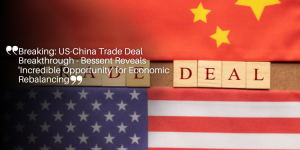UK Government Rejects ‘Buy British’ Initiative: Why Open Trade Remains Priority Amid US Tariffs
Open-Trading Nation
The UK government is taking a clear stance by reaffirming its commitment to being an open-trading nation, even amid the recent imposition of US tariffs.
By rejecting calls for a protectionist ‘Buy British’ campaign, Downing Street shows its determination to maintain open trade principles.
The government believes that, despite the challenges posed by US tariffs, an open trading approach is in the country’s best long-term interest.
Declining the ‘Buy British’ Campaign
Downing Street has declined to officially endorse a ‘Buy British’ campaign as a reaction to the tariffs implemented by the US under former President Donald Trump.
Donald Trump’s administration imposed a 10% import tax on nearly all UK goods entering the US and additional 25% levies on aluminum, steel, and cars.
The Chancellor of the Exchequer, Rachel Reeves, has criticized this initiative by labeling it “inward-looking” and arguing that it wouldn’t serve national interests.
Instead, the government is looking at alternatives suited to support British businesses without resorting to protectionism.

Avoiding Inward-Looking Policies
Chancellor Reeves has emphasized the dangers of adopting inward-looking trade policies.
During her talks with the House of Commons, she reiterated that ratcheting up trade barriers is not in the best interest of the UK’s economy.
According to Reeves, inward-looking policies could lead to a less dynamic national economy and could potentially isolate the UK further from the global market.
Such isolation could negatively impact supply chains and increase inflation, further aggravating the economic situation.
By maintaining its stance on open trade, the government aims to reassure British manufacturing and production sectors amid international trade challenges.
The focus is on balancing support for local industries while still engaging in fair and advantageous trade practices worldwide 🌍.
Transition to Strategy Against US Tariffs
As the government firmly establishes its stance on being an open-trading nation and avoids protectionism, the next strategic response will involve addressing the impact of US tariffs.
The focus will shift towards negotiating a tariff mitigation strategy and seeking diplomatic solutions without escalating into a trade war, providing a pragmatic and cool-headed approach that represents national economic interests.
Impact of US Tariffs on UK Trade
The 10% Import Tax
The recent imposition of a 10% import tax by the US on nearly all goods coming from the UK has serious implications.
This blanket tax affects a vast range of products, from consumer goods to industrial equipment.
Consequently, UK businesses are facing increased costs, which have the potential to be passed down to consumers, disrupting trade flows and making UK goods less competitive in the US market.
Additional 25% Levies on Key Industries
The situation is compounded by additional 25% levies on aluminum, steel, and cars.
These industries are especially vulnerable to changes in their operating environment due to their reliance on international supply chains and the high costs of their products.
The automobile sector, in particular, could see a decline in exports as the tariffs make British cars more expensive for US buyers.
Implications for UK Businesses and Supply Chains 💼
| Implication 💡 | Description 📉 |
|---|---|
| 💸 Cost Increases | British exporters may face significant cost increases due to higher tariffs, leading to higher prices for consumers or reduced profit margins for businesses. |
| 🔄 Supply Chain Disruption | Tariffs may disrupt supply chains, especially for businesses relying on raw materials or components sourced from the US, causing delays or shortages. |
| 🌎 Reduced Competitiveness | UK goods may become less competitive in the US market due to tariff barriers, potentially leading to a loss of market share to countries not facing similar obstacles. |
Businesses are adjusting their strategies to cope with these changes.
Some might consider shifting production to other markets or altering their supply chains to reduce dependency on US imports.
Government Response
The UK government has emphasized the importance of negotiations over immediate retaliatory measures.
The focus is on diplomatic discussions to mitigate the tariffs and secure a favorable trade deal with the US. This approach shows a commitment to maintaining open trade principles and avoiding escalation into a full-blown trade war.
While the government seeks to protect British businesses and mitigate the negative impacts of these tariffs, officials have also acknowledged that some measures to support local industries may be necessary.
However, this support will be balanced with the broader goal of preserving the UK’s status as an open-trading nation.
As the UK navigates these challenges, the balance between supporting local industry and maintaining open trade principles remains delicate.
The government’s strategy and its impacts on British firms and the wider economy will continue to evolve as negotiations with the US progress.
Government’s Strategic Response
Focus on Negotiating Tariff Mitigation
The UK government is navigating the challenges posed by the recent US-imposed tariffs with a clear focus on diplomatic negotiation rather than immediate retaliation.
The US has imposed a 10% import tax on nearly all UK products entering its market, along with additional 25% levies on aluminum, steel, and cars.
These measures have prompted concerns about increased costs and disruption in supply chains for UK businesses.
However, instead of resorting to tit-for-tat strategies, Downing Street is prioritizing efforts to mitigate these tariffs through negotiation.
Prime Minister and Chancellor Rachel Reeves have emphasized the importance of remaining an open-trading nation and avoiding a trade war.
Reeves criticized reactionary measures, labeling them as “inward-looking” and detrimental to the country’s broader economic interests.
The UK government’s position is clear: uphold principles of open trade while addressing the challenges posed by the tariffs through diplomacy.
Prioritizing Diplomatic Solutions Over Trade War Escalation
Recognizing the potential harm of a full-blown trade war, the UK is taking a cool-headed approach in its dealings with the US.
Rather than escalating the situation with retaliatory tariffs, the government seeks to resolve the issue through strategic dialogue.
Downing Street has conveyed that open conversation and negotiation are more beneficial in establishing long-term, sustainable trade relations with the US.
Chancellor Reeves’s statements in the House of Commons underscore this stance, where she reassured that the government would act decisively in the national interest while emphasizing pragmatism and level-headedness 💼.
The aim is to pursue the best possible deal with the US, recognizing that an escalating trade war would hurt not just the UK but global markets.
Ongoing Discussions for a Favorable Trade Deal
Continuous dialogue and discussions with the White House are underway as part of the UK’s efforts to negotiate a favorable trade deal 🌟.
This approach is seen as a way to alleviate the impact of the current US tariffs and secure a more stable trading future.
The government’s strategy includes leveraging diplomatic channels to find common ground and create mutually beneficial agreements 🤝.
Aware of the stakes, the Prime Minister’s team is focused on securing concessions that can soften the blow of the tariffs on UK industries.
This includes engaging with US counterparts to highlight the importance of open trade policies that support economic growth for both nations.
As the government works to protect national economic interests and support local industries, maintaining a balance between open trade principles and fostering a robust domestic market remains key.
This pragmatic approach reflects the ongoing efforts to navigate the complexities of international trade relations and economic diplomacy 🌍.
The next steps involve ensuring that the UK remains resilient and prepared to adapt to any further developments.
The government’s commitment to supporting British businesses while upholding trade openness continues to be its guiding principle, ensuring the stability and growth of the national economy amidst international trade challenges 📈.
Supporting British Business Alternative Approaches
Review of Whitehall Procurement Rules
The UK government has declined to support a “Buy British” campaign as a response to US tariffs.
However, it is keen to explore alternative methods to support British businesses.
One such method under review is the revision of Whitehall procurement rules.
These rules could be adjusted to provide British firms with an advantageous position when bidding for government contracts.
By doing so, the government aims to ensure that British businesses have a fair shot at securing these potentially lucrative deals, thus helping them to better withstand the impact of the US tariffs.
This strategic maneuver aligns with the government’s stance of encouraging open trade while still protecting domestic interests 🛠️.
By revising procurement rules, the government does not have to endorse an insular trade policy; instead, it finds a middle ground that both supports local businesses and upholds the principles of fair and open international trade 🌍.
Reforms to Government Contracts Accessibility
Alongside the review of procurement rules, there are ongoing reforms aimed at making government contracts more accessible to UK businesses, particularly for small and medium-sized enterprises (SMEs) 📊.
The government recognizes that these SMEs form the backbone of the British economy and is working to break down barriers that typically prevent them from competing for public sector contracts.
These reforms include simplifying the procurement process, making it less bureaucratic and more transparent.
Ensuring that SMEs have a real opportunity to bid and win contracts is crucial for fostering a competitive and resilient national market 💪.
These changes are part of a broader effort to foster a more inclusive and supportive environment for all British businesses 🇬🇧.
Balancing Local Industry Support and Open Trade Principles
The challenge for the UK government lies in finding the right balance between supporting local industry and maintaining its identity as an open-trading nation.
On one hand, there is a clear need to protect and promote domestic businesses.
On the other, the government is committed to the principles of free trade and understands the long-term benefits of engaging in a global market 🌍.
To achieve this balance, the government is taking a multi-faceted approach.
While it refrains from endorsing the “Buy British” campaign, it continues to look for ways to advantage British producers and manufacturers.
This is done by ensuring that they are well-positioned to compete effectively, both at home and abroad.
As we consider the broader economic implications and look to the future, the government is keenly focused on safeguarding national economic interests while fostering international trade relations 🌍.
Economic Implications and Future Outlook
Market Resilience and Economic Stability
Despite the recent trade tensions with the US, the UK’s economy has shown remarkable resilience.
According to the Bank of England, the markets are functioning efficiently, and the banking system remains robust 🏦.
This assurance comes as a relief to many who were concerned about potential economic disruption due to the imposed tariffs.
The Bank’s confirmation of stability reflects the strength and preparedness of the UK’s financial institutions in navigating international trade challenges.
Government Commitment to National Interests
Prime Minister and Chancellor Rachel Reeves have both emphasized the government’s unwavering commitment to protecting the national economic interests.
The administration has made it clear that it prioritizes securing a favorable trade agreement with the US over engaging in a retaliatory trade war 🛑.
Chancellor Reeves has consistently argued that escalating trade barriers would hurt both inflation rates and supply chains, thereby impacting the overall economy negatively 📉.
The government reassures businesses and families that it stands ready to act decisively in their favor.
Discussions with the White House are ongoing, with the aim of striking a pragmatic and beneficial deal for the UK.
The focus remains on diplomacy and achieving actionable alternatives to reduce the impact of the tariffs.
A Pragmatic Approach to Trade Relations
Adopting a pragmatic, cool-headed approach is seen as the most viable strategy to manage the intricacies of international trade relations 🌐.
This involves continuous dialogue and negotiations to reduce tariff burdens while avoiding a trade war.
The government’s strategy is strongly anchored in the belief that maintaining an open trade policy is advantageous for the nation in the long term.
Chancellor Reeves has explicitly rejected inward-looking initiatives like the ‘Buy British’ campaign, asserting that such measures are counterproductive in a globalized economy 🌍.
Instead, the government is exploring alternative avenues to bolster British businesses, such as revising procurement rules to favor domestic firms in securing government contracts.
This balanced approach supports local industries while adhering to the principles of open trade.
Transition
Next, we delve deeper into these alternative approaches, examining how the UK government plans to support British businesses while navigating complex international trade dynamics.







